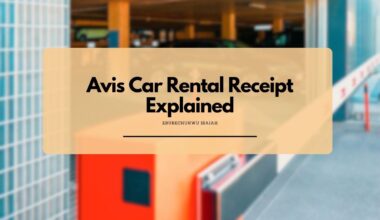As an Amazon Associate, I earn a small commission from qualifying purchases. Learn more about this.
Traveling on a budget is all about understanding hidden costs, and when it comes to car rentals, the devil is often in the details.
Avis, like many other car rental agencies, includes a ‘Concession Recovery Fee’ in their billing. What is it, and is there any way to avoid it? Keep reading to find out how this fee impacts your travel budget
What is the Avis Concession Recovery Fee?
The Avis Concession Recovery Fee is a charge that you’ll often find in your final bill when you rent a car from Avis.
Simply put, this fee is meant to help Avis recoup the costs that they incur for operating out of a location like an airport, train station, or other places where they have to pay concession fees to the governing body of that location.

Here’s how it works: Airports and other similar venues usually charge car rental companies for the right to operate within their premises.
This could be in the form of a percentage of sales, a fixed fee, or a combination of both. These fees can be quite substantial, and so Avis, like many other car rental agencies, passes this cost onto consumers in the form of a Concession Recovery Fee.
You might wonder why this fee isn’t just included in the advertised daily rate for the car.
The reason is that concession fees can vary widely depending on the location. A busy international airport, for example, may charge significantly more than a small regional terminal. By listing it separately, Avis can adjust the fee according to the specific costs incurred at each location.
Now, the fee isn’t hidden; it’s usually clearly outlined in the terms and conditions when you rent a car.
However, it’s easy to gloss over this part when you’re in a rush to finalize your reservation, which is why it often comes as a surprise to many renters reviewing their final bill.
It’s important to note that Avis isn’t the only car rental company that charges this type of fee.
Most companies operating out of airports or similar facilities charge something similar. However, the rates and naming conventions may differ from one company to another, making it a bit of a murky area for consumers who don’t often rent cars.
How Much is the Avis Concession Recovery Fee? Can you calculate it?
Unfortunately, there’s not a one-size-fits-all answer because the fee varies depending on the location from which you’re renting.
The Concession Recovery Fee is generally a percentage of your total rental cost, excluding taxes and other fees.

A common range for car rental companies is between 10% to 12%, although it can go higher or lower based on the specific agreement the company has with the particular concession location.
For Avis, this is usually 11.11% but could also vary based several conditions.

So, for instance, if your rental cost is $200, and the Concession Recovery Fee is set at 11%, you’re looking at an additional $22 for that fee alone.
Why does it vary?
Airports, train stations, and other places that charge concession fees to car rental companies like Avis each have their own fee structures.
An airport in a bustling city might impose a higher fee compared to a smaller, regional location. Thus, Avis adjusts its Concession Recovery Fee based on what it costs them to operate out of each specific location.
Can you calculate it in advance?
If Avis has disclosed the specific percentage that will be applied as a Concession Recovery Fee for your rental location, then yes, you can estimate it yourself.
However, keep in mind that this is just an estimate; the actual fee could be affected by changes in local rates or additional costs incurred by Avis.
It’s important to read through the terms and conditions when you make a reservation, as the Concession Recovery Fee should be mentioned there. If it’s not, or if you’re still unclear, don’t hesitate to contact customer service for clarification.
Are There Ways to Avoid It?
1. Location Matters: Concession Recovery Fees usually come into play when renting from locations within airports, train stations, and similar venues. So, if you’re flexible with your pickup location, consider renting from an Avis location that’s a bit farther from these hubs. Yes, it might mean a slightly longer ride to get to your rental car, but the savings could be worth it.
2. Compare, Compare, Compare: Before you lock in your reservation, it’s wise to shop around. Different car rental agencies may have different agreements with concession locations, leading to varying fees. While one agency might have a higher daily rate, their Concession Recovery Fee could be lower, making the overall cost less. Always calculate the total estimated cost, not just the daily rate.
3. Long-Term Rentals: If you’re renting a car for an extended period, inquire about long-term rates. Sometimes, companies provide discounts or waivers on certain fees for rentals that span several weeks or more.
4. Ask Directly: It may sound too straightforward, but sometimes simply asking if there’s a way to waive or reduce the fee can yield results. It’s not a guarantee, but customer service representatives might have flexibility, especially if you’re a loyal customer or part of a rewards program.
Conclusion
Understanding the concession recovery fee is important for a couple of reasons.
First, it impacts the total cost of your car rental, so budget-conscious travelers should take it into account when comparing rates.
Second, it’s a non-negotiable fee. Unlike some other additional options or insurance coverages that you can opt in or out of, the Concession Recovery Fee is a fixed part of your bill when you rent from locations that charge these concession fees to Avis.







